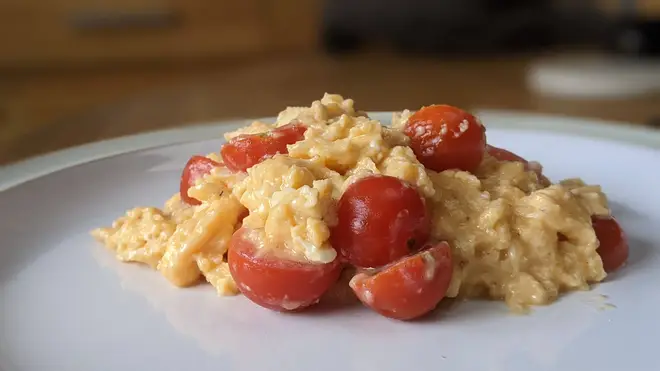
Nick Abbot 10pm - 1am
4 May 2022, 09:54

The University of Cambridge researchers suggest their results could be useful in the development of automated or semi-automated food preparation.
A robot “chef” has been trained to taste food at different stages of the chewing process to check if it is salty enough, imitating a similar process in humans.
The University of Cambridge researchers suggest their results could be useful in the development of automated or semi-automated food preparation by helping robots to learn what does and does not taste good, making them better cooks.
When food is chewed, people notice a change in taste and texture.
For example, biting into a fresh tomato at the height of summer will release juices, and as it is chewed, saliva and digestive enzymes are released, changing our perception of the tomato’s flavour.

The robot, which has already been trained to make omelettes, tasted nine different variations of scrambled eggs and tomatoes at three different stages of the chewing process.
It then produced taste maps of the different dishes.
The researchers found this “taste as you go” approach improved the robot’s ability to quickly and accurately assess the saltiness of the dish.
Grzegorz Sochacki from Cambridge’s Department of Engineering, the paper’s first author, said: “Most home cooks will be familiar with the concept of tasting as you go – checking a dish throughout the cooking process to check whether the balance of flavours is right.
“If robots are to be used for certain aspects of food preparation, it’s important that they are able to ‘taste’ what they’re cooking.”
Co-author Dr Arsen Abdulali, also from the Department of Engineering, said: “Current methods of electronic testing only take a single snapshot from a homogenised sample, so we wanted to replicate a more realistic process of chewing and tasting in a robotic system, which should result in a tastier end product.”
To imitate the human process of chewing and tasting in their robot chef, researchers attached a probe – which acts like a saltiness sensor – to a robot arm.
They prepared scrambled eggs and tomatoes, varying the number of tomatoes and the amount of salt in each dish.
Using the probe, the robot “tasted” the dishes in a grid-like fashion, returning a reading in just a few seconds.
In order to imitate the change in texture caused by chewing, the team then put the egg mixture in a blender and had the robot test the dish again.
The different readings at different points of this chewing produced taste maps of each dish.
According to the study, there was a significant improvement in the ability of robots to assess saltiness over other electronic tasting methods, which are often time-consuming and only provide a single reading.
Researchers say that by imitating the human processes of chewing and tasting, robots will eventually be able to produce food that humans will enjoy and could be tweaked according to individual tastes.
Dr Abdulali said: “When a robot is learning how to cook, like any other cook, it needs indications of how well it did.
“We want the robots to understand the concept of taste, which will make them better cooks.
“In our experiment, the robot can ‘see’ the difference in the food as it’s chewed, which improves its ability to taste.”
Dr Muhammad Chughtai, senior scientist at with domestic appliances manufacturer Beko, which is collaborating on the project, said: “We believe that the development of robotic chefs will play a major role in busy households and assisted living homes in the future.
“This result is a leap forward in robotic cooking, and by using machine and deep learning algorithms, mastication will help robot chefs adjust taste for different dishes and users.”
The findings are published in the journal Frontiers in Robotics & AI.